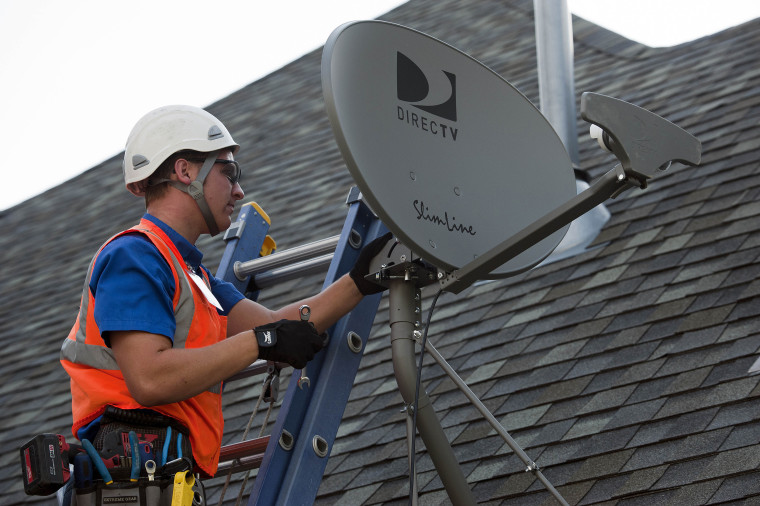Telecom giant AT&T, under pressure from an activist investor, is exploring a possible sale of its satellite TV unit DirecTV, a source familiar with the matter confirmed to NBC News.
The satellite TV company has suffered subscriber losses as consumers shift to contract-free streaming video services. AT&T acquired DirecTV in 2015 for $67 billion as it worked to diversify away from its core phone business as part of a broader plan to marry video and wireless access. The company had no immediate comment when contacted by NBC News.
The most likely buyer of DirecTV is the only other player in the satellite business, Dish Network, which saw its stock jump 4 percent in after-hours trading on Wednesday.
On Tuesday, Charlie Ergen, the co-founder and chairman of Dish, confirmed to NBC NEWS he had been pitched the idea of a merger of the two satellite services. He gave an indication of interest while noting there were no talks.
“There has always been industrial logic for Dish and Direct to get together,” he said at the annual Goldman Sachs media and telecom investor conference. “We’d look at anything. We’re practical, right, not emotional. As a company if we can buy a paperclip manufacturer and make money, we’d buy a paper clip company.”
Ergen noted that there are regulatory issues that would likely make the combination of two satellite companies a tricky proposition. But in a world of declining pay-TV subscriptions, and with new streaming services from Disney, Apple, AT&T and Comcast on the horizon, the companies could argue to regulators that the landscape looks very different for competitors in the pay-TV business these days.
The Justice Department previously demanded that AT&T shed a major asset such as DirecTV in order to gain regulatory approval for its Time Warner acquisition, which Justice tried to block. AT&T ended up victorious in a long-running court battle over the deal.
A Dish-DirecTV combination has been widely touted by Wall Street analysts who see few buyers of satellite companies in a world of internet-delivered video.
Together, the two services would have around 29 million video customers combined, according to JP Morgan analyst Phil Cusick. That would make it one of the biggest players in the pay-TV world.
Ergen noted from the stage at the investor conference that AT&T was "going through a lot of pain and trauma" but emphasized that the company was "stable."
AT&T has not yet officially confirmed it is considering selling DirecTV, but activist investor Elliott Management acquired a $3.2 billion stake in the telecom player last week and has urged a shake-up of the company. The hedge fund sent a letter calling for the company to spin off assets including DirecTV and its Mexican telecom assets.
Commenting on the letter, AT&T CEO Randall Stephenson, also at the Goldman Sachs conference Tuesday, said he agreed with some of Elliott Mangement's recommendations.
“There are some things in the letter that we look at and say that makes a lot of sense,” Stephenson said, adding that other suggestions were not so clear. Stephenson is spending big to ensure the success of the company’s newest streaming offering, including a new multi-million dollar deal for “Big Bang Theory." He also said he was working to reduce the company’s debtload.
One question for any potential new owner will be what to do about DirecTV’s deal for NFL “Sunday Ticket,” which costs $1.5 billion a year and is due for renewal.
Meanwhile, Dish is working with phone company T-Mobile to acquire mobile subscribers and wireless spectrum to create a fourth competitor in the cellphone carrier business. The deal came together as part of a package of concessions offered to the Department of Justice by T-Mobile in order to secure a rubber stamp on its proposed merger with Sprint.
The merger, and the Dish partnership, is subject to a lawsuit brought by scores of state attorneys general who are against it. A court will hear the case Dec. 9. Ergen said that he couldn’t predict the outcome of that case, telling NBC News that he “never ceased to be amazed by how court decisions go one way or another.”

